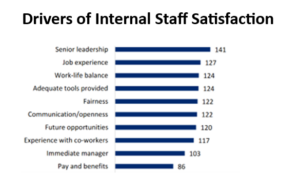When small staffing firms take on big brand competitors, the larger firms usually win, right? In many cases, yes, but not all of the time.
Despite having 44% market share, deep resources and the ability to undercut smaller competitors, the top 100 staffing firms have weaknesses or gaps that small firms can fill. Smart strategies can enable smaller firms to grow and thrive — or even outpace their goliath competitors.
For instance, firms that focus on global clients often ignore niche companies and buyers that require more dedicated attention. For Mirtes Lobaito, CEO and founder of New Jersey-based AGM Tech Solutions, this habit spells opportunity.
“Clients are tired of transactional relationships with staffing firms; they want to be heard,” says Lobaito, who credits her consultative sales approach with generating $100 million in revenue in just five years. “We take the time to understand what a client’s needs are, then we make their problems our problems.”
If you’re tired of being the underdog, here’s a look at the strategies, tactics and attitudes that leaders of small staffing firms are employing to compete with — and outperform — larger competitors.
Look Big, Act Small
The most successful leaders leverage best practices of both large and small companies. On one hand, they use technology, social media and recognition awards to build credibility with prospective clients and contingent workers. On the other hand, they use their small size to deliver service and solutions in unique, customized ways.
“Our digital presence makes us seem larger than we are,” explains Amar Panchal, CEO of Akraya, a San Francisco-based technology staffing firm. “But in reality, we service around 30 customers that we know intimately.”
‘We like to say that we are big enough to deliver, but small enough to care.’ – Amar Panchal, CEO, Akraya.
Here’s another example: According to SIA research, DE&I remains a priority for close to 80% of organizations. Akraya has seized this opportunity to distinguish itself from larger competitors through its Women Back to Work program, which gives companies access to a diverse pool of candidates.
When you’re a small staffing firm, you have two distinct advantages over the big guys: customer relationships and service, notes Carol Ann Schneider, founder of Seek Careers, a commercial staffing firm with offices throughout Wisconsin.
“What differentiates us is communication,” Schneider says. “We are in constant communication with our clients and candidates. In fact, we even have someone on call from 5 p.m. to 6 a.m.”
As a smaller firm, you almost certainly can’t compete on price, but you can compete on value and service.
People Advantage
Recruiting and retaining internal talent is also easier for smaller firms because they turn intangible qualities — like great cultures and work environments — into tangible assets that larger competitors often don’t have. Satisfied employees are more likely to go the extra mile, nurture customer relationships and provide consistent, high-quality service.
“We juxtapose ourselves against the bigger firms by offering people the opportunity to work in a smaller, less bureaucratic organization,” Panchal says. “We’ve also gone fully remote, which helps us attract experienced tech recruiters, even in the shadow of Google.”
A smart move, considering that staff who said their management allowed no remote time at all reported the lowest net promoter scores (NPS) in SIA’s recent North America Internal Staff Survey. Because small staffing firms have fewer employees, they have the opportunity to play an integral role in its success.
Management Access and Agility
Clients like having access to local managers who make decisions quickly, especially when time is of the essence.
Case in point, AGM Tech Solutions’ Lobaito rolled the dice when she agreed to add staff and an office to fill contract positions for a company in Atlanta, more than 800 miles away. But her gamble paid dividends. Today, half her team supports the Atlanta market.
Big staffing firms take time to turn when market conditions shift, whereas small staffing firms can make adjustments and decisions on the fly, explains Rickey Green, CEO of San Jose-based healthcare staffing provider Power Personnel.
‘We make client-centric decisions that bring value and growth, because we follow our hearts, not our wallets.’ – Rickey Green, CEO, Power Personnel
Talk about responsiveness. When cities issued shelter-in-place orders during the pandemic, Green wasted no time in offering travel nurses temporary housing. Later, when demand for travel nurses subsided and hospitals demanded price concessions, he found ways to reduce operating costs without cutting internal staff or sacrificing service.
By being agile and accessible, staffing entrepreneurs can find the right balance between risk and reward.
Leverage the Home Field Advantage
In their home markets, smaller staffing firms have a strong presence and access to talent that gives them a competitive advantage.
As national firms eliminate brick-and-mortar branches, clients turn to locally based firms for intelligence about the talent market, Power Personnel’s Green says.
“We know where to find people, that the big firms don’t,” he says. “For instance, when hospitals started pushing back on travel nurses, we were able to find local people, even some who were willing to convert to full-time status.”
And when Seek Careers decided to seek out potential candidates, Schneider encouraged team members to get involved in community service. This gave the company and its employees a chance to “give back” while meeting people who could use their help in establishing a career, Schneider says.
Know Who You Are
Finally, small staffing firms can beat major competitors by not trying to be all things to all people.
“It’s important to be honest about who you are — and who you are not — to get your foot in the door,” Lobaito says. “Believe in your capabilities and build your credibility by delivering on your promises.”
No matter how large they may seem, every competitor has weak points. But with the right attitude and strategies, it is possible to fight the big guys and win.









